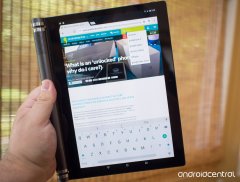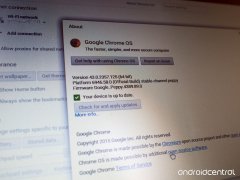Large tablet with keyboard
 Google now has two platforms for desktop-class computing, but which experience is up to the task of being a standalone laptop?
Google now has two platforms for desktop-class computing, but which experience is up to the task of being a standalone laptop?
While it may be easy to look at Chromebooks and mock them for being "just a browser" or look at an Android tablet and call it "just a big phone, " it turns out there's not a lot of truth behind the derision. We've entered an era where the browser is the platform for a lot of work and play, and apps come in all shapes and sizes. That's not to say there's no need for high-end computing machines, especially for folks who need that hardware for games and resource-intensive tasks, but it does mean there are lots of options out there now for web-focused and casual users.
It also means Google has a pair of platforms for you to choose from, and we took a look at why you might consider one over the other.
Chromebooks and Android tablets seem like they should exist at cross purposes, but more and more we see these operating systems have a great deal in common. Chromebooks do a great job looking offering a new experience for folks who are used to the traditional Desktop interface, while tablets take the mobile experience and give you a larger canvas to play with. As it turns out, both are perfectly functional for work and play. If you're embedded in the Google ecosystem, many of your daily activities are thoroughly streamlined. Both support a healthy ecosystem of apps, many of which rely on an internet connection to function. Both exist through a series of hardware partners that offer compelling options for all kinds of use cases. Most important of all, both are designed from the ground up to be secure and eliminate the sense of maintenance often associated with the traditional computer experience.
 There are still plenty of reasons to consider one of the the other. Tablets, for example, have a huge collection of usability features that make it functional in every environment. While the physical keyboard of the Dell Venue 10 7000 Series is easily as good as a laptop keyboard, there are thousands of virtual keyboard options available to use when I detach the screen from the dock. It's an experience that was built for the hand first, so curling up with it on the couch to game or setting it aside on your kitchen counter feel just as natural as typing on a desk.
There are still plenty of reasons to consider one of the the other. Tablets, for example, have a huge collection of usability features that make it functional in every environment. While the physical keyboard of the Dell Venue 10 7000 Series is easily as good as a laptop keyboard, there are thousands of virtual keyboard options available to use when I detach the screen from the dock. It's an experience that was built for the hand first, so curling up with it on the couch to game or setting it aside on your kitchen counter feel just as natural as typing on a desk.
Apps are another critical part of the tablet experience, as these experiences often feel native. The selection of browsers on Android, the ability to rapidly switch between full screen Netflix and a document or email is a lot nicer to look at than the tabbed browser for everything. While it's true Chromebooks and Android Apps are starting to play nice, and that experience will only continue to improve, it's nowhere near as complete a feel as an Android tablet.
Chromebook usage, on the other hand, boils down to a comparably low cost and an effortless user experience. Seeing devices like the $240 Acer C720 start up effortlessly after two years and run everything nice and smooth makes the extra $400 for that Dell tablet seem ridiculous, even if you are limited to the standard laptop experience with a non-touch, 1366x768 resolution screen. There are plenty of touch and fold Chromebook options out there if you want to spend the extra cash, but the barrier to entry for an enjoyable device in this space is significantly lower than quality Android tablets that offer a functional laptop experience.
It's also important to remember just how much of Chrome OS happens without the user ever needing to lift a finger. These machines are updated on an almost monthly schedule, just like the Chrome browser for your laptop. New experiences and smoother operating parameters are offered across weeks, where Android offers a yearly OS update and regular optimizations and features through Google Play Services. The update process for Chrome OS is often seconds long, and the user can immediately return to their task.
In a nutshell, that's what choosing between a Chromebook and an Android tablet boils down to. Android tablets with laptop inclinations are premium experiences with all of the upsides and downsides associated with Android. Chromebooks range from being almost throw away cheap to incredibly powerful, and while you get a reasonable laptop experience from the entire group of devices you aren't likely to play a lot of hardware-intensive games or curl up on the couch with them. Android tablets need a certain kind of hardware to be considered functional in both environments, because the software is already there. Chromebooks still have a long way to go in order to be considered competitive to Android tablets in the entertainment space, but when it happens it will happen everywhere all at once.
Source: www.androidcentral.com
|
9 - 10.5'' inch tablet keyboard case, COOPER TOUCHPAD EXECUTIVE 2-in-1 Wireless Bluetooth Keyboard Mouse Leather Travel Windows Android Carrying Cases Cover Holder Folio Portfolio + Stand (Purple) PC Accessory (Cooper Cases)
|

|
NuVision 13.3" Full HD - 16GB - Android Internet Tablet with Keyboard Case, Stand & Stylus (TM1318) - Pink Personal Computer (NuVision)
|

|
Portable Foldable Bluetooth 3.0 Wireless Keyboard with Kickstand Stand Holder For Apple iPad iPhone IOS,Andriod Windows Smartphone Tablet PC Accessory (Chonyi)
|
|
7 - 8'' inch tablet keyboard case, COOPER BACKLIGHT EXECUTIVE 2-in-1 Backlit LED Bluetooth Wireless Keyboard Leather Travel Carrying Cases Cover Holder Folio Portfolio Stand with 7 Colors (Black) Personal Computer (Cooper Cases)
|
|
|
10.1" Fusion5 104A GPS Android Tablet PC - 2GB RAM - 32GB Storage - Android 5.1 Lollipop - Bluetooth 4.0 - FM - 1280800 IPS Screen - 6000mAh - 2MP front and rear camera Personal Computer (Fusion5)
|






